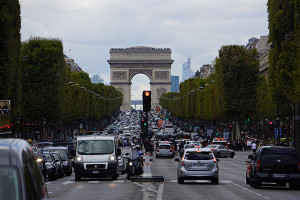Paradoxes of a Smart City – Part 1: Efficiency Increase vs Absolute Consumption
In a previous blog post, the ICLEI Smart Cities team explored three smart cities examples and argued that smart cities are not about technology but about defining their sustainable development path. We also proposed that cities in practice have moved on from the question “what is a smart city?” to “what works for us and what doesn’t?” This is what we call the Smart City 2.0 debate.

The Smart Cities 2.0 debate is not only about pragmatism and addressing local needs; it is also about facing trade-offs and difficult choices, or finding the right balance, when that ‘win-win solution’ we are looking for just doesn’t seem to present itself in practice. This is what we aim to address in our “Three Paradoxes of a Smart City” blog series. In this first post, we will talk about how efficiency increase can actually increase absolute consumption and work against sustainability goals: the phenomenon known as Jevons Paradox.
Jevons Paradox: Does Efficiency Increase Automatically Decrease Absolute Resource Use?
Jevons paradox is one of the most well-known paradoxes in environmental economics. It describes the phenomenon where a system may use more energy or resources, or generate more emissions overall, when it becomes more efficient. Most of us will have experienced this phenomenon in our daily lives: for example, carrying a smartphone should enable us to use our commuting time more efficiently for reading news and writing emails, but actually ends up costing us more time because we’re permanently online. At a city scale, a classic example is when cities add lanes to roads to alleviate traffic congestion. This solution works for a while, but with the increased road space, it becomes more attractive to drive, and the now widened road becomes just as congested as it was before. None of this is real news – and yet, this well-known caveat of efficiency-based solutions seems sometimes quickly forgotten in the Smart City’s technological gold rush.
Jevons Paradox in Smart Cities: A What-If Scenario for Parking Apps
Take the growing number of parking apps and similar ICT-based traffic management solutions out there as an example. An app provider lists available parking spaces from public and/or private owners, hotels, or companies, and the app users can efficiently find the nearest available parking spot closest to their  destinations through this app. This is supposed to help car drivers to quickly and conveniently find one of the few precious parking spaces scattered sporadically in most cities, or those simply too hard to find. In theory, this ensures that the available parking space is used effectively, decreasing traffic and also reducing the fuel consumption of those cars roaming around town to find a parking spot. However, if such apps are successful, they may actually make it more attractive for people to drive inside the city rather than walk, cycle, or use public transport. So, filling parking spaces faster may be an increase in efficiency in principle, but it incentivises people to make unsustainable mobility choices. And if enough people use parking apps to fill the open spaces, cars may actually have to stray through the city streets once more, looking for even fewer available parking spaces, but with one eye on the traffic and one on their mobile device.
destinations through this app. This is supposed to help car drivers to quickly and conveniently find one of the few precious parking spaces scattered sporadically in most cities, or those simply too hard to find. In theory, this ensures that the available parking space is used effectively, decreasing traffic and also reducing the fuel consumption of those cars roaming around town to find a parking spot. However, if such apps are successful, they may actually make it more attractive for people to drive inside the city rather than walk, cycle, or use public transport. So, filling parking spaces faster may be an increase in efficiency in principle, but it incentivises people to make unsustainable mobility choices. And if enough people use parking apps to fill the open spaces, cars may actually have to stray through the city streets once more, looking for even fewer available parking spaces, but with one eye on the traffic and one on their mobile device.
Real Smart Cities keep Jevons Paradox in Mind
This is not to say that parking apps cannot play a role in making cities more sustainable. At the same time, the cases where efficiency increases can have an adverse effects on overall consumption or resource use go far beyond the parking app example. It doesn’t even stop with rebound effects and Jevons Paradox. Smart Sensors, LEDs, IoT solutions and many more so-called smart technologies often focus on saving energy, doing more for less and doing their job better, faster, and more efficiently than their ‘dumb’ predecessors. However, few seem to have reflected holistically on additional electronic waste or increased use of rare earth metals – on their life cycles and supply chains.
There is no doubt that technologies, including ICT, can make our lives easier and make our cities more efficient and sustainable. However, it is important to keep the whole picture in mind and look out for paradoxes regarding efficiency increase and absolute effect. By the same token, we can only call our cities “smart cities” when we see real efforts being made to balance the tradeoffs between efficiency and resource use on the one hand, and livability and sustainability on the other.
This was part one of our blog series “Three Paradoxes of a Smart City”. Stay tuned for the next post, where we pit the integration of urban systems against urban resilience.




